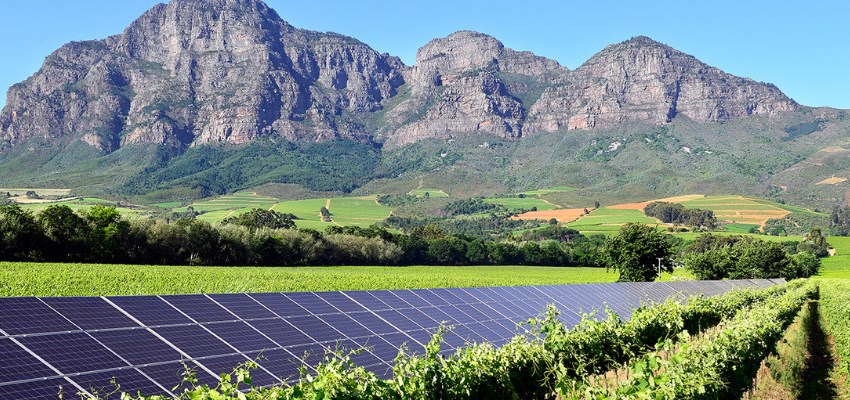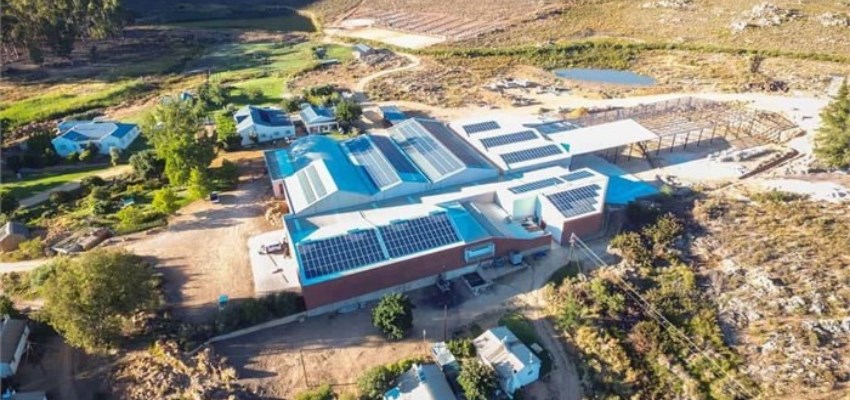
Solar PV power system on Vrede en Lust Estate
An impending carbon tax, as well as increasing customer knowledge about the importance of reducing energy consumption, has heightened interest in South Africa's wine industry's energy performance.
South Africa is among the world's top 10 wine-producing countries. Nearly half of the 1 billion liters of wine produced each year is exported.
The Western Cape province produces approximately 95 percent of the wine. There is now universal agreement that the industry's energy consumption must be lowered. Generally, this can be accomplished through two methods: behavioral modification and technology interventions.
Many wineries and winemakers are eager to incorporate conservation practices into their farming practices. Solar electricity is a step forward that makes sense.
Winemaking requires a lot of electricity, and if this can be regulated by making reductions in this sector of wine production, this money can be put to greater use.
It appears to be an obvious option in sunny South Africa to assist wine farms in not just reducing their carbon footprint, but also creating a renewable energy supply, with the added benefit of not being entirely dependent on the national power grid.
Southern Sun Solar, a solar panel provider, has worked with many wineries and is actively proposing to others.
A single solar panel in South Africa is twice as efficient as one in Germany. Even this relatively small system has already had enormously good consequences on nature.
It saves roughly 7 tons of CO2 each year (the equivalent of planting 42 trees), which is essential not just for the environment, but also for lowering the upcoming carbon tax which will be implemented. South Africa has several hours of sunlight each day, therefore the potential returns of a solar system are substantially higher than in most other countries.
Wine farms harnessing the power of the sun
Douglas Green Bellingham
Douglas Green Bellingham (DGB) exports its wines to over 70 countries worldwide, clearly sees this possibility. There are 2 600 solar panels spanning four roofs totaling 6 200 square meters at their Wellington winery. This is the greatest rooftop solar photovoltaic power station in South African winemaking.
Their solar plant that will take its largest production plant off-grid and the 800 kW solar PV system at its Wellington production facility promises to reduce their carbon emissions to the equivalent of planting 6 800 trees per year which would lower electricity costs, stabilise production and improve marketability.
This would also allow DGB to sell back to the Drakenstein municipality, which includes Wellington, any excess power which would be beneficial to the fight for sustainable energy production in South Africa.
Aaldering Vineyards & Wines
Aaldering Vineyards & Wines in Stellenbosch was established in 2004 and promises on delivering premium quality wines to wine lovers all around the world.
They have installed a solar PV system covering their cellar roof for their state-of-the-art winery and luxury lodges. The 29,925 kW PV system supplies most of their power during the daytime and after installation they have reduced their carbon emissions to the equivalent of planting 267 trees per year, reducing their road traveling by 70 000 km per year, or a reduction of 10 tons CO2.
Cederberg Wines
Cederberg Wines is a Western Cape winery producing award-winning wines from their high-lying vineyards that flourish in a pure, virus-free environment. They have partnered with New Southern Energy and Eskom to install a 257,76 kW solar power system.
The winery is located in the Cederberg Nature Conservancy and harvests 900 tonnes of grapes each year. The solar power system is connected to the national electricity grid which means excess energy can be sold to the neighboring municipalities. Additionally, Cederberg Wines has also reduced the amount of electricity used in the cellar by 75%.
Cederberg Wines showed its commitment to sustainability with this 257,76 kW solar power system. The solar power system since beginning its operations has since cut the farm’s carbon footprint in half. This is equivalent to planting 2 875 trees.

solar energy plant on Cederberg Wines farm
Vrede en Lust
Vrede en Lust in Franschhoek, a modern wine estate catering to all needs of a wine tourist, installed a 218 kW solar PV power system. They cut their carbon footprint in half during daylight hours and their first year. This is because they use their solar panels during the day while the sun is shining. This is more than enough to meet the winery’s power needs and is equivalent to planting 2 300 trees.
In conclusion, more South African wineries are seeing the benefits of going solar. Renewable energy not only lessens your carbon footprint but can also considerably increase your profitability.
The way to a future of sustainable, clean energy in South Africa could not be clearer, and with customers pushing the market for sustainable wines, it appears only a matter of how long before our wine industry is fueled entirely by the sun.

There are plenty of good news stories about upliftment and transformation in the South African Wine Industry. The #wineforgood website, launched by wine.co.za in June 2016, hosts all the positive stories from the winelands, of which there are plenty. wine.co.za has made April a focus for #wineforgood stories. Share them far and wide and spread the good news about South African wine.